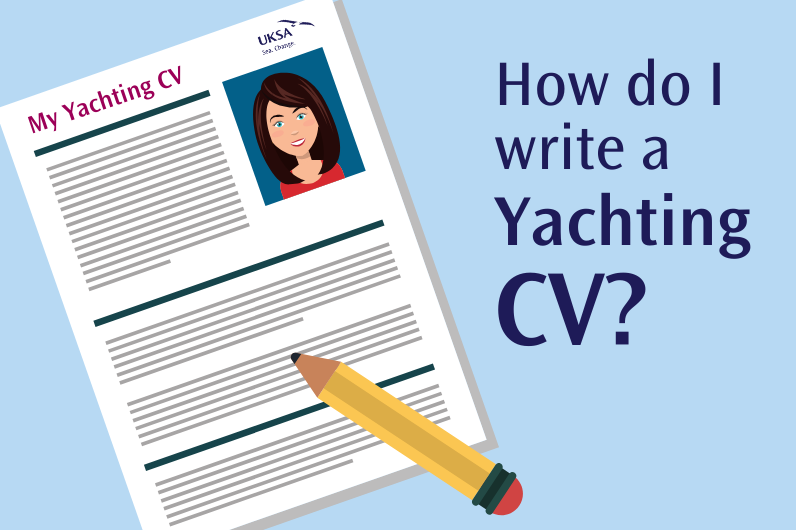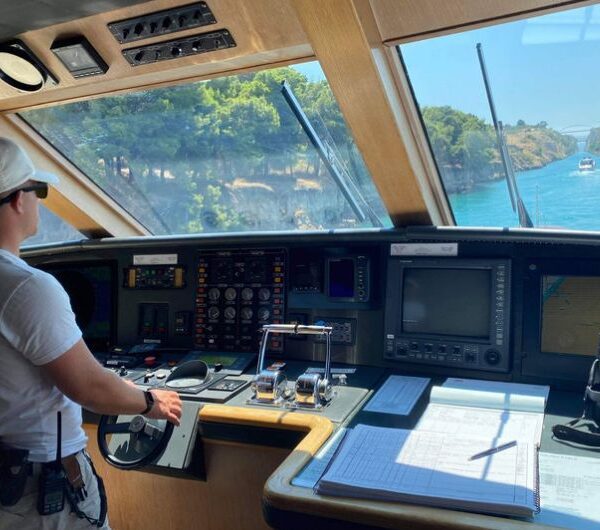
How do I write a yachting CV?

Are you looking to work at sea, perhaps as a deckhand or a steward/stewardess on a superyacht, as a flotilla or charter skipper for a holiday company or even as part of an offshore windfarm team? We have put together a fantastic guide on how to write your all-important eye-catching CV.
Making sure your CV gets placed on the ‘yes’ pile is key to securing your first job in the yachting industry.
Here at UKSA, along with our specialised Careers Courses designed to teach you the necessary skills required to enter into the yachting industry, we also have a Careers and Industry Guidance Team dedicated to helping you make that first step into your dream job.
Not only do we provide industry talks and workshops, we also set up networking opportunities alongside a recruitment service, and with this we offer interview techniques and CV-writing training, with one-to-one support.
What is so special about a yachting CV?
A yachting CV is different from the CVs we are taught to write at school. There is a specific format which you need to follow and you are required to include information about yourself that you might find a little shocking and discriminatory at first, such as your photo, your date of birth as well as your nationality!
Before we discuss the nitty-gritty of a yachting CV it’s important to understand that the yachting industry has an extremely high turnover so when a position becomes available, an employer, crew agent or management company will have a huge number of CVs to sift through. Your CV needs to stand out above the rest and state why you are the right person for the role, all in an initial 5-10 seconds!
So, how do I write my yachting CV?
The Look
Your CV should be clear, concise, using full sentences and a font size no smaller than 11. The layout is extremely important; it must be pleasing to the eye. Make sure your margins line up, the headings and font style match throughout and that your CV is no more than 2 pages long. All phone numbers (both yours and those for your referees) must be in the international format (eg +44). Check for grammar and spelling mistakes and ask someone to proofread it.
No Lies!
You must be truthful! With social media today, anyone can search for you using the information provided on your CV. Don’t pretend to be someone you’re not. If you’re not into dinghy sailing, then don’t say that you are, and if you smoke, then don’t state that you don’t. If caught lying on your CV your application will simply be rejected, or worst still, you could be black-listed by the employer, crew agent or management company (and the yachting industry is a very small industry!).
What else should I think about when writing my CV?
Social Media
Make sure that when an employer searches for you (and they will!) that you have either set your privacy settings so high that they can’t find you, or that you have removed all scandalous photos from your social media accounts; a potential employer won’t want to see you looking a bit worse for wear at a festival! What they will want to see is how you’ve described yourself and your interests matches what they find on Facebook and Instagram.
Top tip: fill your social media accounts with articles relevant to the industry you’re looking to enter into. For example, if it’s the superyacht industry then follow relevant groups and crew agents and share interesting articles pertinent to the industry.
So, where do I start?
The Sections
We have listed below a full list of the sections you’ll need to include in your yachting CV. You can also download our Yachting CV Template here.
Name and Position
Make sure your name (first name and surname) stands out in a larger font at the top of the page and include the position you’re seeking either next to, or under your name. Try to avoid using middle names as this can be confusing.
Photo
It is imperative that you include a photo of yourself otherwise your CV will be discarded immediately. This needs to be a head and shoulders shot of you looking professional and dressed correctly for the position you’re applying for. For those of you looking to enter into the superyacht industry, you must wear a white polo or shirt without logos. Boys must be clean shaven with short, tidy hair.
Top tip: if you can, have water and/or boats in the background and do smile!
Personal details
This is where you list the following:
- Phone Number (in the international format)
- Email Address which must be easy to copy, sensible and professional
- Date of Birth
- Nationality (just state where you’re from – do not state the colour of your skin)
- Health – include “ENG 1” (medical certificate which you will be required to obtain prior to accepting a job) and state if you’re a non-smoker and have no tattoos. If you have any visible tattoos then mention that here. A visible tattoo is one that is not hidden by a polo shirt and a pair of shorts.
- Languages – only to be included if you speak languages in addition to English
- Driving licence – if you only have a provisional or do not have one at all then delete this
- Current Location – there is no need to be too specific; UK or South of France is enough
- Availability
Profile
This is a really important section as it needs to encourage a potential employer to read the rest of your CV. Grab the reader’s attention in 4-6 lines showing them your personality, transferable skills and experience. It should be very specific to you and focus on why you have decided on a career in yachting. State what position you’re looking for and what your end goal is (eg I am looking for a position as a deckhand with a view to one day becoming an officer of the watch).
Maritime Qualifications
List these in order of importance – eg if you have your Professional Yachtmaster Offshore then state that first with your STCW next. List your qualifications as bullet points in two columns in order to save space and for a better overall appearance. Make sure you include all your qualifications relevant to the yachting industry including any dinghy or diving qualifications you’ve obtained previously. If you have your commercial drone pilot licence then include this here. Only put down the top level of each qualification so if you have Day Skipper, don’t include Competent Crew.
Maritime Experience
This section gives you the opportunity to drill down on all of your water-based experience. Include all your previous sea time whether it be from courses, employment, work experience, holidays or voluntary work. Put a new heading for each entry and write a few lines about each one.
Previous Employment
Include all your previous non water-based employment, work experience or voluntary work here. Think about the transferable skills that you have gained from those experiences and bring them to the attention of the reader. You might have skills in hospitality, manual labour and time-management, have a strong work ethic or good organisational skills. Perhaps a previous job required you to be well-presented and with the ability to deal with high-net-worth individuals. These are all important and transferable skills to focus on in this section.
Education
You do not need to go into great detail in this section. Include your university/school/college, the year when you obtained your degree/A levels/BTEC/GCSEs and a summary of your grades (eg 7 GSCSEs grades A-C). Note that GCSEs does not require an apostrophe! Put your most recent achievement first.
Hobbies and Interests
Even though this section will be towards the bottom of your second page it is another very important section where your potential employer can learn what type of person you are and whether you’re likely to be a good fit for the boat or company. Make sure you sound interesting and as someone who’d be a good addition to a crew or team. Just to reiterate, you must not lie!
References
You should try to list 3 referees here with their contact details (name, position, company, telephone number written in the international format and email address). DO NOT say “available on request”. If you already have a written reference then you can add this as a third page to your CV. The quicker an employer can get hold of your references, the more likely you are to get offered the job. Do make sure you’ve asked each of your referees for their permission and let them know that they might be contacted. Previous employers, instructors or teachers are ideal.
Latest posts





















